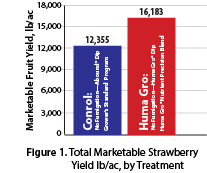
The Phoenix Business Journal award will be given at an August 2nd event at the Fairmont Scottsdale Princess Resort in Scottsdale, Ariz. The Fruit + Vegetable award will be given at the 2018 Great Lakes Fruit, Vegetable & Farm Market Expo in Grand Rapids, Mich., on December 4.
Dr. Abi-Ghanem—a native of Lebanon and a Fulbright Scholar who earned her doctorate in Soil Science from Washington State University—states that she is deeply honored to have been selected for these two awards, and she was quite surprised when notices about her selection for these two unrelated awards with similar names arrived just a day apart. BHN CEO Lyndon Smith stated that he and everyone else at BHN are very proud of Dr. Abi-Ghanem’s accomplishments, and he is pleased that others in the local and national communities are recognizing her contributions to agriculture.
Dr. Abi-Ghanem is an adjunct faculty member of the Department of Crop and Soil Sciences at Washington State University (WSU) and serves as a member of the Humic Products Trade Association Science Committee; the Fluid Fertilizer Foundation Research and Education Committee; and the Arizona Department of Agriculture Pesticide Advisory Committee. She is former Chair of the Women-in-Science Committee of the American Society of Agronomy (ASA), Crop Science Society of America (CSSA), and Soil Science Society of America (SSSA), and is current co-chair of the SSSA Representation and Recognition Task Force. She is currently also serving a 2-year term as a member of the Agricultural Science Committee of the U.S. Environmental Protection Agency’s (EPA’s) Science Advisory Board (SAB) and is an executive board director of the Association for International Agriculture and Rural Development (AIARD).
Dr. Abi-Ghanem was further honored last year when she was presented with the AIARD 2016 Young Professional Award. That award cited Dr. Abi-Ghanem’s early work in assessing seed-borne diseases on wheat and barley landraces in a rural area that borders Syria and participation in the Bill & Melinda Gates Foundation Agricultural Research Connections 2013 Workshop in Kenya. She also participated in the Iraq Agricultural Extension Revitalization Project, in which she and others from Washington State University and four other American universities trained Iraqi agricultural extension agents and scientists through sessions held in 2007–2008 in Egypt, Syria, and Jordan.
Related Posts

This Week in Ag #57
“What are you planting this year?” That may not sound like a trick question, considering it’s already mid-March. But ask any farmer south of the Mason-Dixon line that question and you’ll likely see their shoulders shrug. You see, unlike in the West, where permanent crops and processor contracts make planting decisions more straight-forward, or in the

Univ. of Calif.: Huma Gro® Increases Strawberry Yields 30%
Huma Gro® Ultra-Precision™ Blend Plus Root Dip Increases Strawberry Yields 30%, Univ. of Calif. Conducted by: Surendra K. Dara, PhD, University of California Huma Gro® Products: Ultra-Precision™ Blend; plus root dip of Breakout®, Promax®, Vitol®, and Zap® OBJECTIVE The purpose of this research project was to evaluate how a special blend of fertilizer solution and

Food Processing Wastewater Treatment Solutions
Experience the world’s most efficient wastewater remediation products, for operational stability of food processing wastewater treatment facilities.

